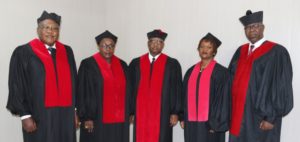By Garmah Never Lomo, garmahlomo@gmail.com
The Justice in Chambers of the Supreme Court of Liberia, Sie-A-Nyene Gyapay Yuoh has declined to issue the writ of Mandamus prayed for by the four-party grouping, the Collaborating Political Parties (CPP) to put a hold on the National Voter Roll Update exercise.
A writ of Mandamus is a court order compelling someone to execute a duty that they are legally obligated to complete.
Justice Yuoh last Friday declined issuing the writ of Mandamus prayed for by the CPP, which includes the former ruling Unity Party, the Alternative National Congress, Liberty Party and the All Liberia Party.
However, the CPP has taken advantage of the law to take their petition to the full bench of the five-member Supreme Court.
The opposition CPP wants a halt to the exercise and the immediate cleaning of the voters roll, which was mandated by the Supreme Court in wake of a law suit filed by the Liberty after the 20017 presidential and general elections.
The filing of the CPP’s writ coincided with the close of the Voters Roll Update exercise.
The Supreme Court, the final arbiter of justice in Liberia is citizens depend on for the dispensation of justice.

Liberia’s Supreme Court Justices
Despite the many recommendations from the Economic Community of West African States (ECOWAS) report and a joint resolution signed by the Legislature, the national voters roll is yet to be cleaned, CPP said.
In their twenty-nine count petition for writ of Mandamus, the CPP pointed out that the ECOWAS report states that the provisional Registration Roll displayed at the registration centers throughout the country claimed a good total 2,182,956 registered voters.
Count eight of the petition speaks about the ECOWAS report or recommendation, which says before the final roll was published, a total of 170,000 suspected duplicate voters extracted, 4,567 of which were confirmed to report a total of 2,183,629 voters were published on the final voters roll, the FRR 30 days to the election on September 11,2017.
Given these facts, if 170,000 suspected duplicates were removed from the provisional Registration Roll, the total number of voters on the FRR ought to have been 2,012,956, and 2,183,629 voters as reported by NEC.
The ECOWAS recommendation Captured by the CPP in count eight of their motion said hence the conclusion is compelling and inescapable that the 170,000 suspected duplicates were never extracted from the voters roll and roll and remains there up to date, rendering the FRR defective and unfit to lay a basis for elections.
Count nine of the CPP’s petition that ECOWAS report also started that the time it gained access to the NEC data base Dec 12, 2017, the total number of registered voters was 2,183,629 and this equals the total registered votes declared by the NEC (FFR total),which also equals the total OMR forms said have been returned from the field and handed over to the data center for processing.
According to their petition, the CPP said since the exhibition of the provisional voters Roll was carried on the 12th of June 2017, the total valid registered voters the team viewed in the database as at this date, was 2,045, 483.
From said analysis, the ECOWAS report concluded that between the time of the exhibition of the Provisional Registration Roll (PRR) and declaring the Final Registration Roll (FRR) a total of 138,146 records were added to the voter roll something the petitioner’s says that there is no evidence up to date that these additional 138,146 voters added to the FRR have been removed from the voters roll.
Count ten of the petition also says that the ECOWAS report stated that the technology used by the NEC cannot identify and remove duplicated voters from the FRR.
That the non-biometric nature of the Voter Roll makes it very difficult to carry out de- duplication despite the limitation of the OMR technology, extending its functionalities a little more to capture two fingerprints (thumb prints preferably) would have help for de-duplication.
Digitizing those prints, using automated fingerprints identification system (AFIS) would have help tremendously the ECOWAS report said.
It further added that the semi-automated method used could not have really help with cleaning the voter roll adding that someone who intentionally wants to commit multiple registrations would most likely not used the same name multiple times.
In addition to this, the de-duplication method used would have exposed the data to false rejection those that are duplicates, but seemingly look alike and are therefore removed and false acceptance letter hose that are duplicates but one reason or another were not removed.
On the other hand, in a joint resolution by the Senate and House of Representatives said they are mindful of the defective nature of the 2017 FRR as acknowledged by the Supreme Court and revealed by the ECOWAS report, in a joint resolution adopted by the Senate and House of Representatives, Ordered the NEC to clean the voter roll among other directives as follows:
That considering that the authenticity and credibility of the 2017 FRR continues to be a source of speculation by the political parties and Civil society Organizations involved with the electoral process, a clan up process of the 2017 FRR shall be conducted by NEC with the involvement of political parties and other stakeholders. This is to enhance the legitimacy and authenticity of the 2017 FRR for use of the 2020 senatorial elections.
CPP petition: That due to the special circumstances appertaining to the 2020 senatorial election and referendum, the NEC shall give written progress report every third (30) days to the Legislature and physically appear to react to concerns of the legislature so as to ensure that all problems faced by the NEC will be promptly resolved and that the senatorial election and referendum will be held on December 8, 2020, among several other things which CPP says the NEC has ignored and decided to do what pleases them.
Recently, the CPP petitioned the Supreme Court of Liberia to issue a writ of Mandamus on the NEC but unfortunately, the Chambers Justice has trashed it out without any legal reason(s).

